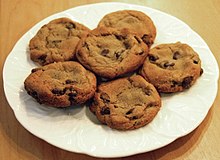Chocolate chip cookie
 5 chocolate chip cookies on a plate. | |
| Alternative names | Toll House Cookie |
|---|---|
| Course | Dessert |
| Place of origin | United States |
| Region or state | Whitman, Massachusetts |
| Created by | Ruth Graves Wakefield |
| Main ingredients | Chocolate chips |
| Variations | Multiple |
| 200 per unit kcal | |
A chocolate chip cookie is a drop cookie from the United States. Small portions of the dough are "dropped" from a spoon onto a baking sheet, then baked 10-15 minutes in a medium oven until done. Main ingredients in the original recipe are flour, butter, eggs, salt, vanilla extract, both brown and white sugar, and chocolate chips. Variants feature nuts, oatmeal, etc. Chocolate chip cookies can be made at home or purchased at bakeries and in stores.
The chocolate chip cookie was the accidental invention of Ruth Graves Wakefield. She and her husband owned and operated the Toll House Inn in Whitman, Massachusetts in the mid-1930s. Wakefield prepared meals and desserts. One day she was without Baker's Chocolate for a butter drop cookie recipe. She cut a Nestlé's semi-sweet chocolate bar into bits and added the bits to the dough, thinking the pieces would melt as the cookie baked. The bits did not melt completely, but they did soften. The result was called the Toll House Cookie. Nestlé printed the recipe on its packages of chocolate. Wakefield received a lifetime supply of Nestlé semi-sweet chocolate for her permission to print the recipe.[1][2][3]
Preparation
[change | change source]Chocolate chip cookies are made by using white sugar, brown sugar, flour, salt, eggs, baking soda, butter or shortening, and chocolate chips. Some cookies optionally add vanilla, milk, or nuts for more flavor.[4]
References
[change | change source]- ↑ History of Chocolate Chip Cookies & Ruth Wakefield
- ↑ Chocolate Chip Cookies: A Brief History
- ↑ "All About Chocolate Chip Cookies". Archived from the original on 2013-04-11. Retrieved 2013-04-21.
- ↑ Armbrister, W.L.; Setser, C.S. (1994). "Sensory and Physical Properties of Chocolate Chip Cookies Made with Vegetable Shortening or Fat Replacers at 50 and 75% Levels". Cereal Chemistry. 71 (4): 344–351.
